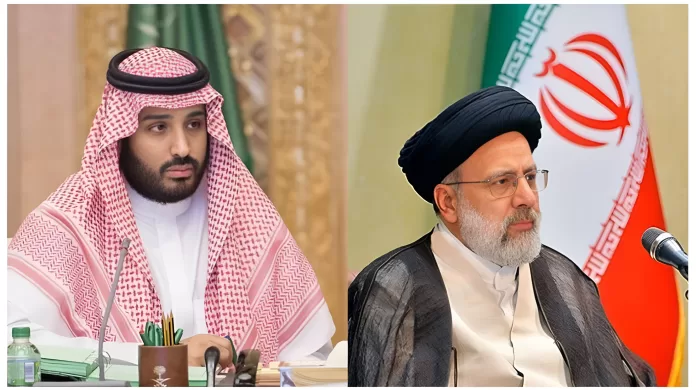As far as détentes go, this one must be up there with the all-time greats. Saudi Arabia and Iran have been at loggerheads as far as memory can go. The leading Sunni and Shia powers in the region have even been at odds in the recent past as well. Consider.
2011 – During the Arab Spring, Saudi accused Iran of inciting protests in Bahrain against the royal family. 2011 – Iran backed President Bashar Al-Asad while the Saudis, along with the USA, supported the rebel groups. 2015 – the war in Yemen again saw the Saudis and Iranians on different sides of the fence.
Iran sided with the Houthis and Saudi with the internationally recognised government. 2015 – tempers flared again when about 200 Iranian pilgrims were killed in the Hajj stampede in Mecca resulting in Iran suspending Hajj participation. 2017 – Qatar was blockaded by Saudi Arabia and its allies citing that it was too close to Iran. During the same time, the Saudi government said that a missile intercepted in Riyadh came from Iran, this also raised the temperature in the region.
It said the same thing about attacks in the kingdom a couple of years later. 2018 – when Trump pulled out of the Iran nuclear deal, the move was praised by the Saudi administration.
2020 – the killing of Iranian military commander Qassem Soleimani by a US drone strike in Baghdad was celebrated by official Saudi media. It is a long list, isn’t it?
Policies are meant to change with the change in global winds and the China-sponsored Iranian-Saudi deal is a testament to that fact!
Nevertheless, this rapprochement confirms the prophetic statement of British Prime Minister Henry Temple, “We have no eternal allies, and we have no perpetual enemies. Our interests are eternal and perpetual, and those interests it is our duty to follow”.
At the heart of it all lies the global ambition of China! Even a couple of years ago one could have been forgiven to think that the US may be behind this reconciliation. Not anymore! While the Biden administration worries about China’s growing clout in the Middle East, it officially sees this development as a ‘win-win’.
Since the expected positive outcomes from the much-touted Iran nuclear deal may not be in the offing, for Iran this China-led initiative may just pick up the slack
Sen. Chris Murphy, who leads the Senate Foreign Relations Committee’s Middle East panel, said that not everything between the US and China has to be a zero-sum game and a de-escalation between Saudi and Iran is a good thing. However, there have been mumblings in the White House and Capitol Hill that the US is behind the curve in the Middle East and the recent ‘shrug of the shoulder’ response was the only possible retort to developments that are quickly getting out of America’s control! For China, this is its first diplomatic foray in the region but it has been clever enough to stick to the art of the possible – for now.
This agreement confirms the principles of conflict resolution and not the solutions to be reached. China is playing the long game – a tactical win at this stage and a strategic win if the end fruits materialise!
Nevertheless, China can claim one big achievement even today – getting Saudi and Iran to backtrack their extreme positions on the war in Yemen by which Riyadh agreed to Tehran’s request to announce the restoration of diplomatic relations before Iran halted support to the Houthis.
With restricted access to Western technology and markets, particularly for Chinese telecom vendors, China is also looking at this initiative to develop more trade, technology, and energy opportunities in a new region.
For its part, Riyadh is banking on Beijing’s leverage to keep Tehran in check. China has already satisfied the kingdom by ensuring that the Iranian component not only includes diplomats but also security officials particularly the Islamic Revolutionary Guard.
Furthermore, MBS has given China the benefit of doubt in these parleys because all such previous initiatives – and all at the losing end – were done at the behest of Western powers. This suggests that the Kingdom is willing to give China’s credibility a go and China is willing to give the role of sponsor a go. Something that should inconvenience the US at the least and give US policy makers nightmares at the most! Since the expected positive outcomes from the much-touted Iran nuclear deal may not be in the offing, for Iran this China-led initiative may just pick up the slack.
Iran would also be looking forward to utilising Saudi influence on other Middle Eastern countries such as UAE, Bahrain, and Egypt to ensure favourable regional conditions with respect to economy and trade. Riyadh has reportedly also committed to less belittling coverage of Iran by Iran International, a Persian-language satellite news channel funded by people linked to Saudi royalty. Thus, there may be some local reprieve particularly as both have confirmed to “respect of sovereignty of states” with “non-interference in internal affairs”.
China has already satisfied the kingdom by ensuring that the Iranian component not only includes diplomats but also security officials particularly the Islamic Revolutionary Guard
For all three countries, it is a realisation of new paradigms and new opportunities. Policies are meant to change with the change in global winds and the China-sponsored Iranian-Saudi deal is a testament to that fact! Perhaps the same should be asked of Pakistan and its neighbours but one feels that is a tall order to consider.




